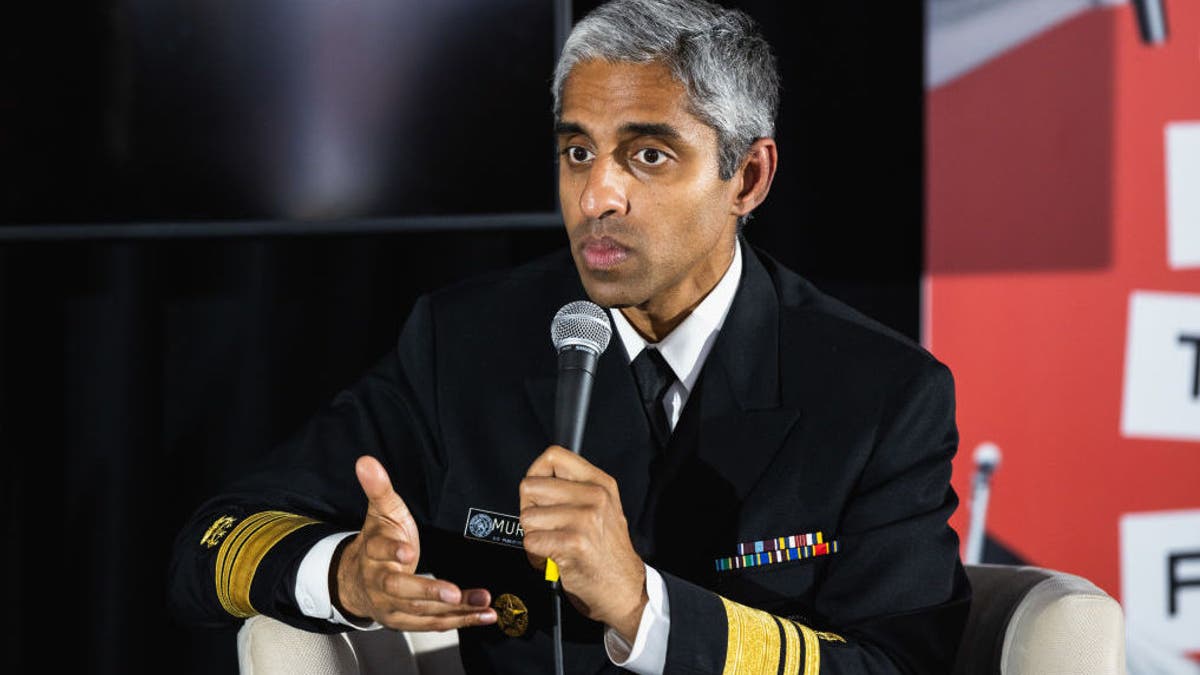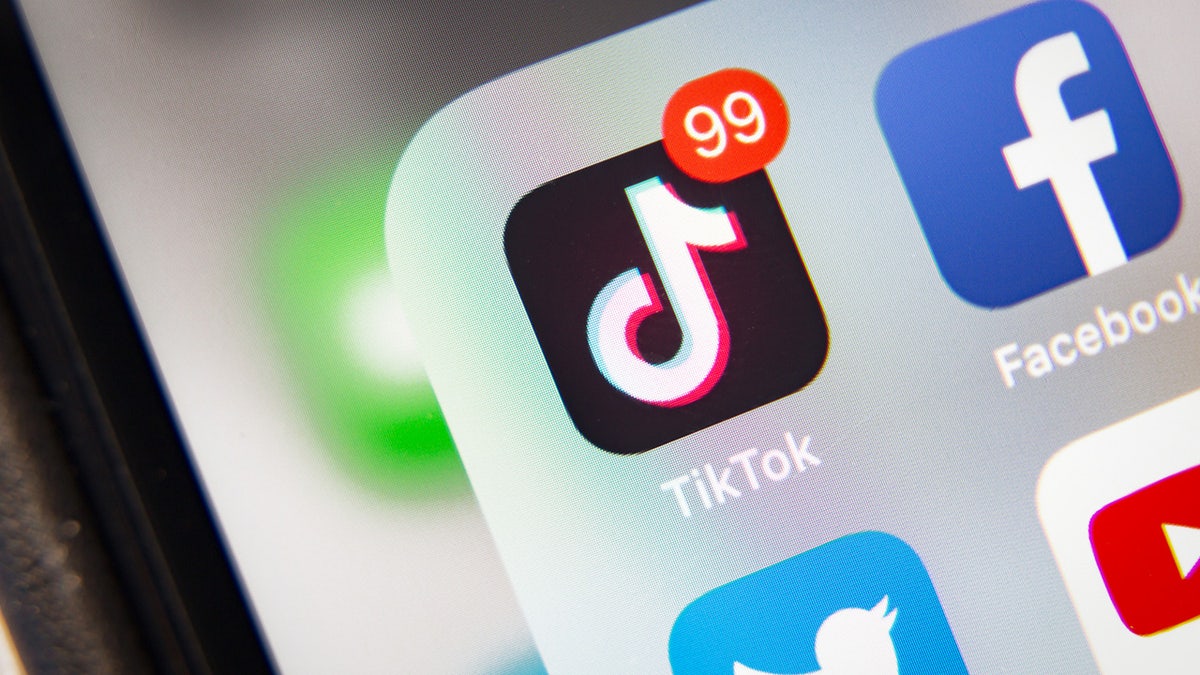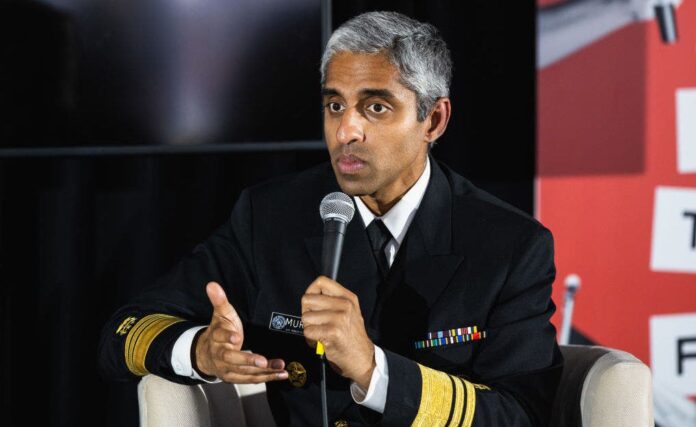NEWYou can now listen to Fox News articles!
On June 17, current Surgeon General Dr. Vivek Murthy, who also served under former President Donald Trump, called for new warning labels on social media platforms. The language he wants states that “social media is associated with significant mental health harms for adolescents.”
This follows Murthy’s public advisory last year warning that social media contributed to “a national youth mental health crisis.” According to his advisory, “adolescents who spend more than three hours per day on social media face double the risk of experiencing poor mental health outcomes, such as symptoms of depression and anxiety.”
Yet research shows teens on average spend nearly five hours per day on social media. Murthy also warned that age 13 is “too early” for social media and has previously suggested 16 as a better starting point.
SUPREME COURT RULES ON CHALLENGE TO BIDEN ADMIN’S EFFORT TO INFLUENCE SOCIAL MEDIA
These warnings are backed with good reasoning. In 2023, former Meta employee and whistleblower Arturo Bejar revealed an internal survey showing that 13% of young teens ages 13-15 received “unwanted sexual advances on Instagram in the last seven days alone.” As reported in the Wall Street Journal’s 2021 “Facebook Files,” Meta’s internal research found that one-third of teen girls reported Instagram made them feel worse about their bodies.

Vivek Murthy, US surgeon general, warns that social media is harmful to children. (Jordan Vonderhaar/Bloomberg) (Getty Images)
It’s not just Meta. These problems are widespread across social media. In 2023, researchers from the Center for Countering Digital Hate found that TikTok’s algorithms served up content related to suicide within three minutes of downloading the app. Within eight minutes, it displayed content from communities promoting eating disorders.
The surgeon general is well-intentioned. But warning labels are unlikely to make a significant difference. People are desensitized to them because they’re everywhere, on cigarettes, alcohol, prescription drugs, food, cars, power tools and countless everyday products.
“In general, warning labels by themselves [are] just not effective,” said Oriene Shin, policy counsel at Consumer Reports. Shin said that warning labels “really need to be coupled with safe design. [They’re] the icing on the cake rather than the end all be all.”
There is also some debate that warning labels can be counterproductive. Experiments published in Harvard Business Review revealed that in some cases “a warning label can increase a product’s appeal.” Additionally, there has been legal pushback in recent years on First Amendment grounds. In 2022, a federal judge ruled that the U.S. Food and Drug Administration can’t mandate graphic warning labels on cigarettes.
The U.S. government has mandated warning labels on cigarettes for over 50 years — and smoking rates have thankfully decreased significantly. Yet these labels were accompanied by vast educational efforts along with strong policies, including cigarette taxes, banning cigarette sales for minors, and smoking bans in offices, restaurants, bars and most public areas.
In these divided times, protecting kids from the harms of social media is one of the few issues that voters and leaders on both sides support. Yet despite numerous attempts at federal legislation, nothing has passed through the congressional gridlock.
For instance, despite being a bipartisan bill with 62 co-sponsors, the “Kids Online Safety Act” just can’t muster passage. It has sound components, but includes some controversial pieces, like its “duty to care” directive.
This would hold tech firms accountable for harm minors might suffer from viewing content and demands platforms “prevent and mitigate” such content. The vague language risks censorship of political speech.

Congress could pass age verification to limit harm to younger users of social media. (iStock)
Another bipartisan bill stalled in Congress is the “Protecting Kids on Social Media Act.” While it has several strong elements, it is complex and includes controversial pieces too, such as requiring teens to get parental permission to use social media. This has raised concerns among advocates for teen privacy and free speech rights.
What immediate steps can we take to protect America’s youth?
First, instead of omnibus legislation, Congress can excerpt and pass the best part of the “Protecting Kids Act”: to “prohibit the use of algorithmic recommendation systems on individuals under age 18.”
This would include a ban of anything being boosted or targeted at minors. It contributes to a “mental health crisis.” Enacting this now will halt such practices.
Second, there must be legislation mandating that large social platforms like Facebook, Instagram, Twitter/X and TikTok implement age verification for users. The rules must be highly protective of our privacy rights, collecting the minimum personal information necessary to confirm a user’s identity.
CLICK HERE FOR MORE FOX NEWS OPINION
We’ve got to give up our rights to online anonymity to achieve this, otherwise adults or trolls can still pose as kids, and kids often lie about their ages too. As stated in the Surgeon General’s 2023 advisory, “nearly 40% of children ages 8–12 use social media.”
Third, educators and parents can take action right now. Schools can follow the lead of the Los Angeles Unified School District (the nation’s second-largest school district), which voted on June 18 to ban cellphones and social media use for its K-12 students during school days.
Another bipartisan bill stalled in Congress is the “Protecting Kids on Social Media Act.” While it has several strong elements, it is complex and includes controversial pieces too, such as requiring teens to get parental permission to use social media. This has raised concerns among advocates for teen privacy and free speech rights.
Parents can take a stronger position (not always easy) restricting their kids’ phones/social media at night to promote better sleep; and encouraging critical thinking skills to help young people avoid being manipulated.
CLICK HERE TO GET THE FOX NEWS APP
To this last point, the MIT Center for Advanced Virtuality is an example of an online media literacy course for college students and educators. Similar educational initiatives can help improve media literacy and critical thinking skills downstream with kids and teens.
These initiatives won’t solve all the problems, but they’re tangible first steps that will have a real impact. The surgeon general recognizes that warning labels are at best a complement rather than a primary solution. Just like with cigarettes, it was the powerful laws that taxed and banned their usage, combined with courageous efforts by smokers to quit, that produced favorable results. Slapping warning labels on social media platforms without significant protective actions is akin to putting icing on an exploding cake.
Source link





